The 7th form Food. Meals. Lesson.
Objectives:
practical: to revise vocabulary and communicative formulas to give pupils possibility to speak in the situations; to practice active vocabulary on the topic; to practice pupils' speaking, listening, reading and writing skills.
to revise grammar ( using a lot of / lots, a few / a little); to develop free speaking using personal experience and knowledge on the topic;
educational: to develop creative imagination and logical thinking; to get acquainted with the cuisine traditions of the UK and Ukraine.
cultural: to broaden pupils' interest to English; to widen pupils' knowledge about food habits.
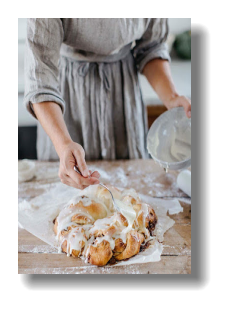 The 7th form Food. Meals
The 7th form Food. Meals
Objectives:
practical: to revise vocabulary and communicative formulas to give pupils possibility to speak in the situations; to practice active vocabulary on the topic; to practice pupils’ speaking, listening, reading and writing skills.
to revise grammar ( using a lot of / lots, a few / a little); to develop free speaking using personal experience and knowledge on the topic;
educational: to develop creative imagination and logical thinking; to get acquainted with the cuisine traditions of the UK and Ukraine.
cultural: to broaden pupils’ interest to English; to widen pupils’ knowledge about food habits.
Equipment: students’ book by O.Karpuk; cards / tasks, CD, DVD, compu-ter, video ...
Procedure:
- Introduction
T: Good morning, dear friends! Glad to see you! P: Nice to see you, too!
T: How are you? P: We’re fine! And you?
T: I’m fine, too! Thank you! Sit down, please! Today we’re going to speak about something we cannot live without, we will speak about eating habits, watch a short movie and learn what is the traditional English meal.
We need it to be healthy, to have much energy, to fight illnesses. We usually have it three times a day. So, what is it? Did you guess? P: Is it food?
T: Yes, we’re going to talk about food, meals in our country and in the UK. We’ll see what food you like and what food you hate.
- Warming-up
T: a) Let’s revise some words, try to pronounce them correctly and try to remember as many words as you can. The pupil who names all the words wins.
- Listen to the speaker and repeat:
rice, eggs, biscuits, bread, pineapples, cherries, orange, fish, meat, potatoes, carrots, tea, tomatoes, cheese.
b) You know, I’m going to the supermarket. I’ve made up a shopping list. But what a pity. My cat’s spilled my tea on the shopping list. I cannot read it. Will you help me, please?
|
1. bre___ 6. ja___ 2. sau___ 7. cer__ 3. che___ 8. eg___ 4. sug___ 9. mi___ 5. but___ 10. oi___ |
c) T: Now let’s imagine that we have a guest from Britain? And we all are journalists; let’s ask him about his favourite food and traditions!
Does your family have a common meal?
What is your attitude to fast food?
Don’t you think that a lot of fish &chips can make harm for health?
What is your favourite food?
Where do you usually buy products?
d) Let’s sing a song. Sing and act. Do You Like Broccoli Ice Cream? https://www.youtube.com/watch?v=frN3nvhIHUk
Lyrics: Do you like broccoli? Yes, I do!
Do you like ice cream? Yes, I do!
Do you like broccoli ice cream? No, I don't. Yucky
Do you like donuts? Yes, I do!
Do you like juice? Yes, I do!
Do you like donut juice? No, I don't. Yucky!
Do you like popcorn? Yes, I do!
Do you like pizza? Yes, I do!
Do you like popcorn pizza? No, I don't. Yucky!
Do you like bananas? Yes, I do!
Do you like soup? Yes, I do!
Do you like banana soup? No, I don't. Yucky!
e) Speaking.
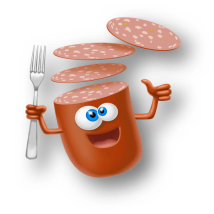 T: Answer my questions, please.
T: Answer my questions, please.
- What’s your favourite food?
- Where do you go to buy food?
- Do you make a shopping list?
- What do people do in the kitchen?
- Who does cooking in your house?
T: Complete the sentences:
- Three meals of the day are…
- Three things you eat with are…
- Three parts in a meal are…
- Two things you find on a restaurant table are…
- Two things you put on salad are…
- Checking on the home task
T: Your home task was to revise some grammar. Can you tell us when we use a lot of / lots of, a few / a little.
- Let’s play a game. I say a word. You have to use a few or a little with the word correctly. The team that does it well gets a point. Is it clear? Let’s start.
T: chocolate P: a little chocolate, …
- Open your books on page 74 and do exercise 2. Complete the questions using “ a little” or “a few”.
-
 I’ve got a nice cake. Would you like …?
I’ve got a nice cake. Would you like …?
- Do you want me to make you … sandwiches?
- Do you want … sugar in your tea?
- Do you need … more information about this cell phone?
- Let me give you … advice.
- Would you like … slices of cheese?
- Open the window! We need … fresh air here!
- You will get … nice presents for your birthday, won’t you?
- Would you like … coffee to help you stay awake?
- Shall I give you … money to buy some souvenirs?
- Main part of the lesson.
- Watching the video
- Pre-watching
T: The video you’re going to watch is about children who live in the UK. The first video clip features a boy called Nick, his sister, Molly, and their mother and father. You are going to learn about some of the things people in Britain eat.
- T: What do you know about British food? Can you name any dishes or special foods? Have you ever eaten something typically British? What is it made from? Did you like it?
- Т: Now I offer you to watch a movie about eating habits of British people!
https://www.youtube.com/watch?v=smKDD5Wl2B8
Watch a movie very attentively, fill in the table and answer the questions
|
Breakfast |
Milk, cereal, toast with jam, fruit juice, tea, coffee, bacon, eggs, tomato |
|
Lunch |
Sandwich, snack |
|
Dinner |
Meat, fish, vegetables, pizza, pasta |
T: Let’s revise the names of the meals in Britain. Look at the pictures. Watch, listen, repeat and guess what the words mean:
cereal, toast, apple crumble, roast beef, dessert, a packed lunch, a takeaway, a supermarket, a Sunday roast, Yorkshire pudding, custard
- While watching
- Activity 1. T: Now watch and tick the food terms that you see in the video clip about food. (Each pupil gets a photocopy of Activity Sheet 1)
- Work in groups. Activity 2. T: Look at the Activity Sheet 2 and match each speech bubble to the person who says it, by writing M, D, N or MO.
- After watching
T: At the bottom of the Sheet 2 you can see tongue twister. Practice saying it in small groups. Then we’ll hold a competition. Each group chooses someone to say the tongue twister. And we’ll choose the winner who can say it the fastest and without mistakes.
T: And now let's have a rest and listen to a song about English food. Try to sing along :) “I like”
https://www.youtube.com/watch?v=z1tdJn0S_wQ
- Listening
- T: Look at the table. Listen and tick what Sally usually has for breakfast, lunch and dinner, then talk about her.
- Tapescript:
- Good morning, Sally! I’m making eggs for breakfast. Would you like some?
- Oh, no, thank you. I usually just have a bowl of cornflakes and a cup of coffee in the morning.
- Well, that’s not a big breakfast. What’s you have for lunch?
- Oh, I never have much time for lunch. I usually have an apple and a glass of Coke.
- That’s all?
- Yes. But I eat a big meal in the evening. I usually have something like chicken and potatoes with a nice big salad.
- Oh, well. That’s all right.
|
Food / Drinks |
Breakfast |
Lunch |
Dinner |
|
eggs |
✔ |
|
|
|
cornflakes |
✔ |
|
|
|
fish |
|
|
|
|
chicken and potatoes |
|
|
|
|
milk |
|
|
|
|
tea |
|
|
|
|
coffee |
|
|
|
|
pizza |
|
|
|
|
salad |
|
|
|
|
apple |
|
|
|
- What do you usually have for breakfast / lunch / dinner?
T: Now I offer you to watch a movie about eating habits of British people! Watch a movie very attentively, fill in the table and answer the questions.
https://www.youtube.com/watch?v=aKbIilKwJwg
|
Breakfast |
Milk, cereal, toast with jam, fruit juice, tea, coffee, bacon, eggs, tomato |
|
Lunch |
Sandwich, snack |
|
Dinner |
Meat, fish, vegetables, pizza, pasta |
- What is ‘convenience food’?
- What food do the British teenagers prefer?
- What’s your favourite food?
T: Now let’s imagine that we have a guest from Britain? And we all are journalists; let’s ask him about his favourite food and traditions!
- Does your family have a common meal?
- What is your attitude to fast food?
- Don’t you think that a lot of fish &chips can make harm for health?
- What is your favorite food?
- Where do you usually buy products?
T: Role- play. Restaurant . Role Cards Work in pairs. Each student takes one card.
|
You are the customer: |
You are the waiter: |
|
You are the customer: |
You are the waiter: |
|
You are the customer: |
You are the manager: |
|
You are the customer: |
You are the waiter: |
|
You are the customer: |
You are the waiter: |
|
You are the customer: |
You are the manager: |
- Writing
T: Do you write a shopping list when you go to the supermarket?
- Watch the video, tick and write things that Mum buys. Now work in small groups and compare your answers. Watch the video again and check your answers.
T: Imagine you are going to the supermarket. Make up your own shopping list.
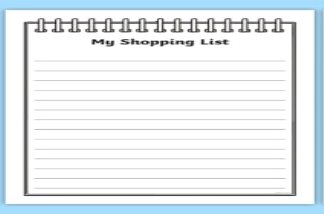
- Summing up

 T: Our lesson is coming to the end. We worked well today. What new information have you learned today? I would like to listen to your impressions of it. Would you like to cook some British food at home?
T: Our lesson is coming to the end. We worked well today. What new information have you learned today? I would like to listen to your impressions of it. Would you like to cook some British food at home? 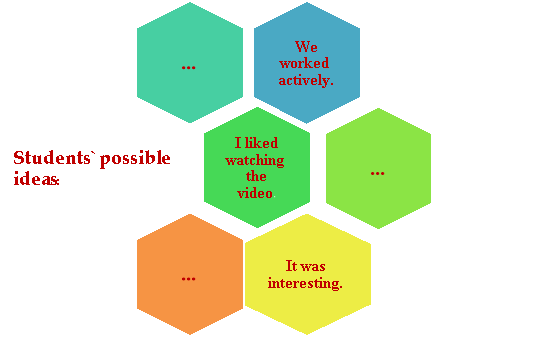
- Home assignment
T: Your home task for the next time is to write down what you usually eat for breakfast, lunch and dinner.
 Would you like to cook some British food at home? I want to recommend you a pudding recipe from Oli-via, my English friend.
Would you like to cook some British food at home? I want to recommend you a pudding recipe from Oli-via, my English friend.
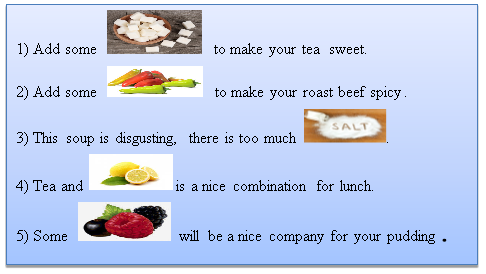
- T: Find out the recipes of famous British dishes and make presentations.
Appendix:
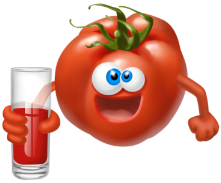
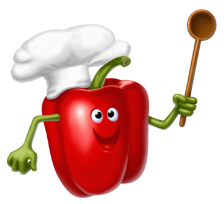

-





 FIND THE VOCABULARY RELATED TO FOOD IN THE PUZZLE
FIND THE VOCABULARY RELATED TO FOOD IN THE PUZZLE
![]()
![]()

|
S |
T |
F |
R |
E |
N |
C |
H |
F |
R |
I |
E |
S |
B |
|
|
|
E |
T |
R |
S |
E |
C |
O |
D |
N |
O |
M |
E |
L |
N |
|
R |
R |
R |
W |
V |
D |
O |
T |
C |
Z |
V |
N |
F |
N |
B |
|
A |
V |
O |
C |
A |
D |
O |
D |
C |
C |
T |
B |
N |
B |
A |
|
W |
S |
W |
R |
P |
L |
K |
O |
N |
I |
O |
N |
O |
N |
|
|
B |
E |
E |
F |
P |
P |
I |
G |
W |
S |
M |
W |
L |
M |
A |
|
|
A |
S |
F |
L |
P |
E |
S |
S |
D |
A |
W |
E |
M |
N |
|
R |
S |
E |
H |
E |
L |
S |
A |
D |
E |
T |
X |
M |
O |
A |
|
R |
D |
L |
S |
O |
U |
P |
Z |
C |
E |
O |
C |
R |
Q |
|
|
Y |
S |
P |
P |
P |
P |
S |
Z |
E |
F |
D |
V |
E |
S |
D |
|
E |
L |
P |
P |
A |
E |
N |
I |
P |
F |
E |
V |
T |
Z |
G |
|
A |
T |
A |
S |
L |
S |
E |
P |
F |
O |
W |
B |
A |
U |
|
|
|
R |
G |
R |
A |
P |
E |
S |
D |
C |
S |
A |
W |
J |
N |
|
E |
R |
I |
C |
E |
R |
C |
R |
C |
H |
I |
C |
K |
E |
N |
|
R |
T |
I |
S |
R |
C |
C |
I |
C |
E |
C |
R |
E |
A |
M |
1


про публікацію авторської розробки
Додати розробку







